Google Nexus 4 Review - Google's new Flagship
by Brian Klug on November 13, 2012 8:45 AM EST- Posted in
- Smartphones
- LG
- Android
- Mobile
- APQ8064
- Nexus 4
- Android 4.2
- MDM9215
The Nexus 4 is based around a 1.5 GHz Qualcomm Snapdragon S4 Pro SoC, the quad core Krait APQ8064 with Adreno 320 GPU, which is still built on a 28nm process. The combination of APQ8064 for AP and MDM9x15 for baseband is Qualcomm's Fusion 3 platform, and the Nexus 4 and Optimus G are the first phones to market based on that platform. This is a relatively unique opportunity for Nexus, which until recently wasn't really first to market with the latest and greatest silicon.
A while ago we posted our Nexus 4 and Nexus 10 performance preview. At that point we still had a lot of testing to perform, and many people noted that the Nexus 4 performance was far behind the LG Optimus G despite it being based on the same platform. Later, some people noticed that I had uploaded another set of results from GLBenchmark 2.5 to the online result browser with much better performance. The difference wasn't some over the air software update but rather that I was running some of the tests with the Nexus 4 in a ziplock bag inside the freezer to mitigate any condensation problems, and simultaneously nail down any possible thermal throttling.
I've re-run everything and can confirm obviously that there was thermal throttling going on affecting some of the results, and have included the new results wherever there was a deviation from previous. For those wondering why the LG Optimus G wasn't affected in spite of it having the same platform, the reason is because the results from the Optimus G were run in parts due to some instability affecting its ability to run a complete set of tests without crashing. The Nexus 4 has newer drivers that don't crash during a full GLBenchmark 2.5 run but as a result run the device long enough for thermal throttling to kick in.
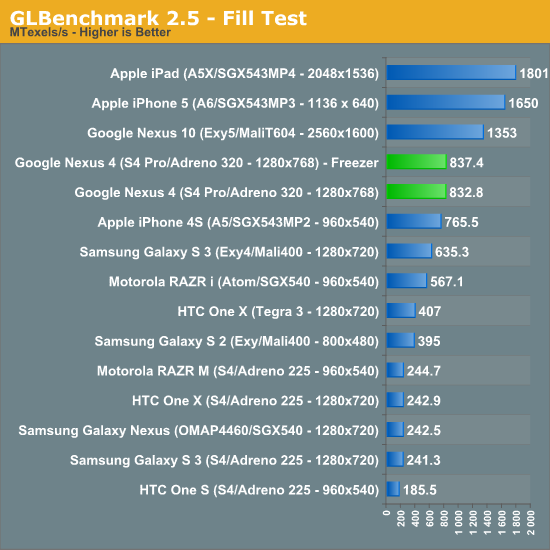
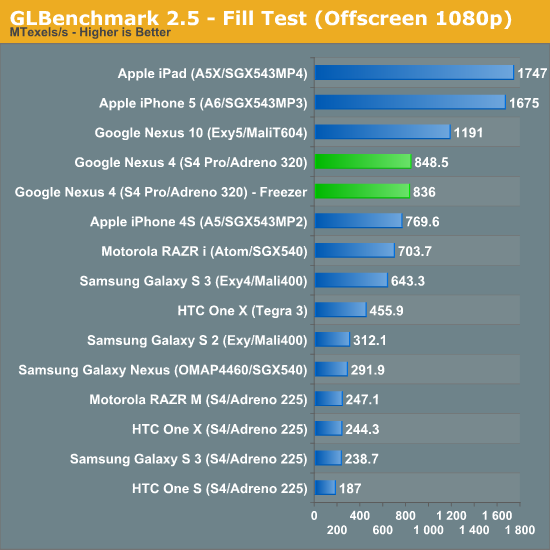
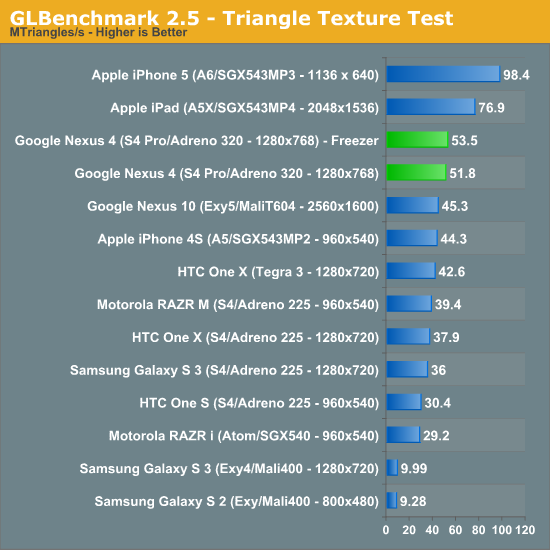
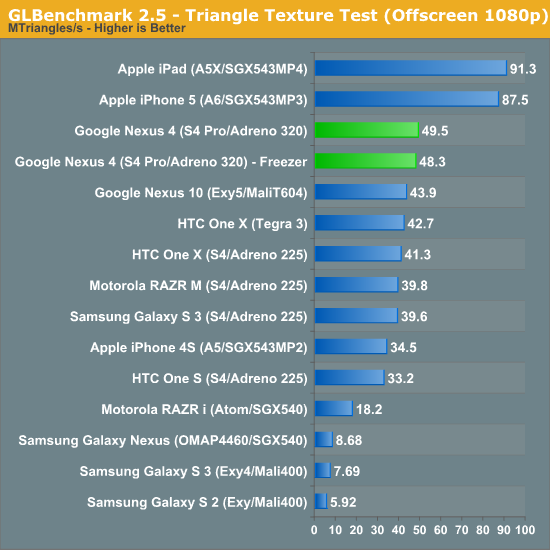
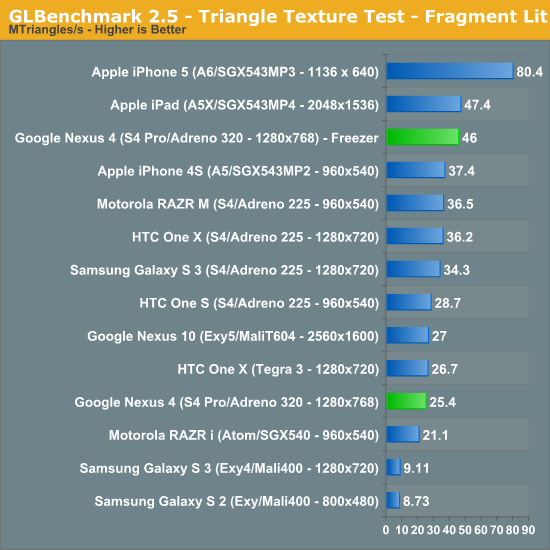
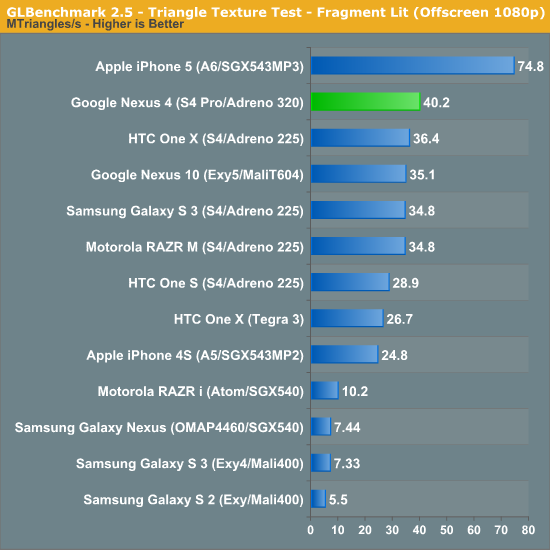
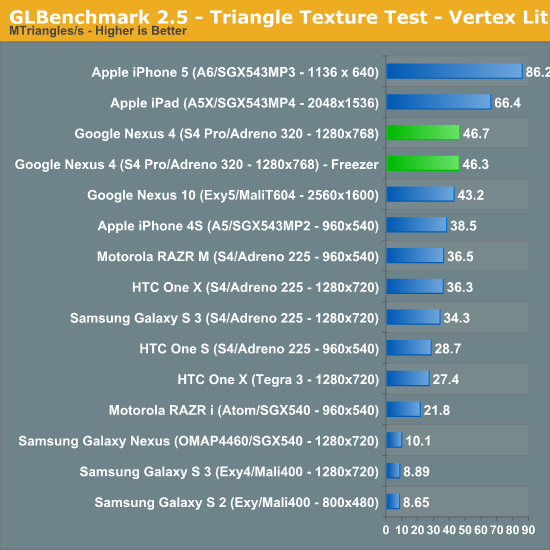
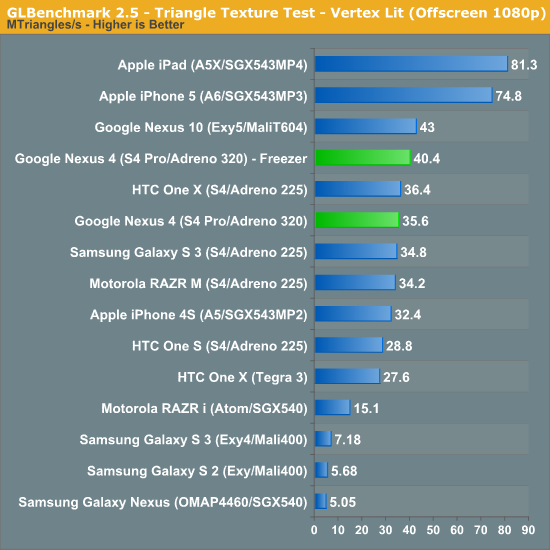
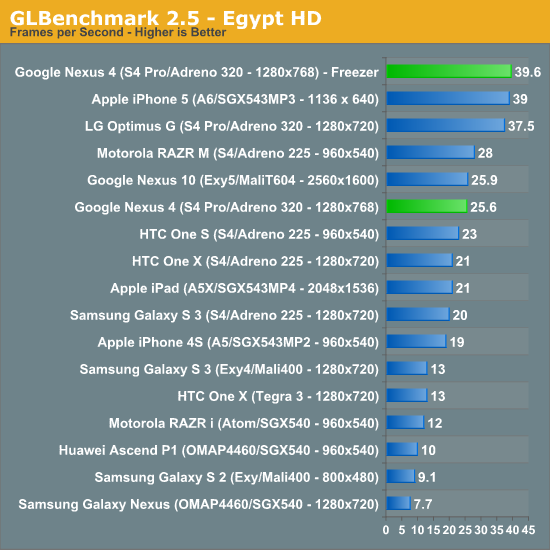
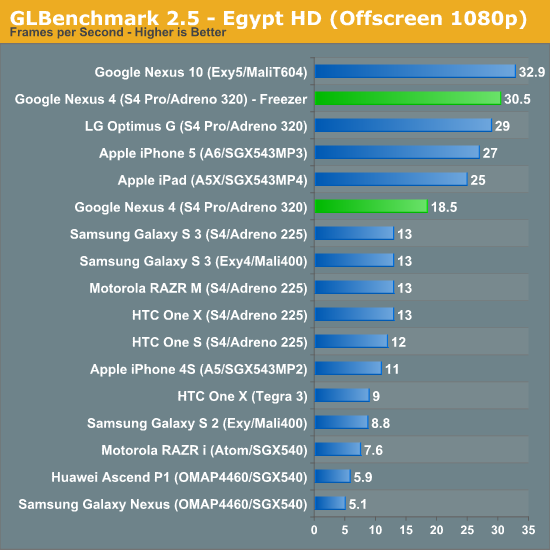
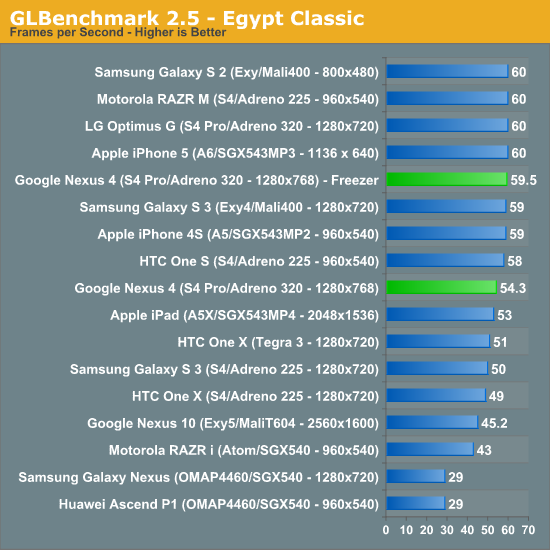
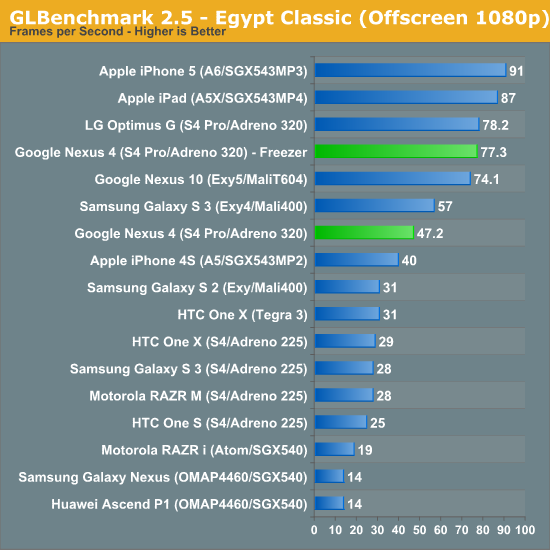
The result of the tests in the freezer results that are much closer to what we'd expect based on the APQ8064 MDP/T runs and the Optimus G numbers I saw in Korea.
When it comes to the CPU side of things there were results also affected by thermal throttling. I spaced some of those runs out (unintentionally) enough that performance didn't change, but for other things it did affect performance. I can't tell what GPU clocks end up being when the SoC decides to throttle, but it is possible to nail down what CPU performance state APQ8064 settles down into when there's throttling going on by looking at the state tables.
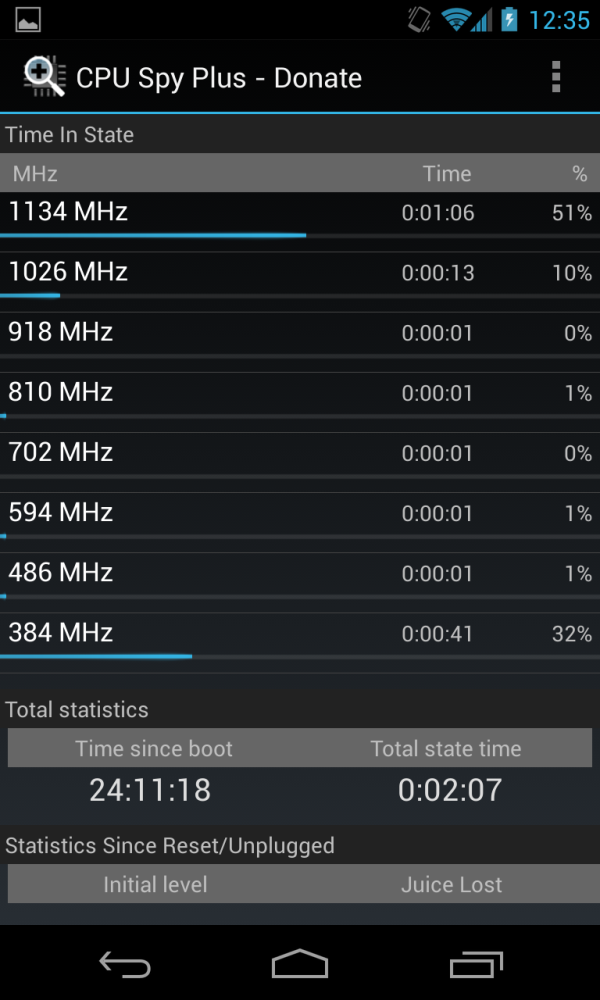
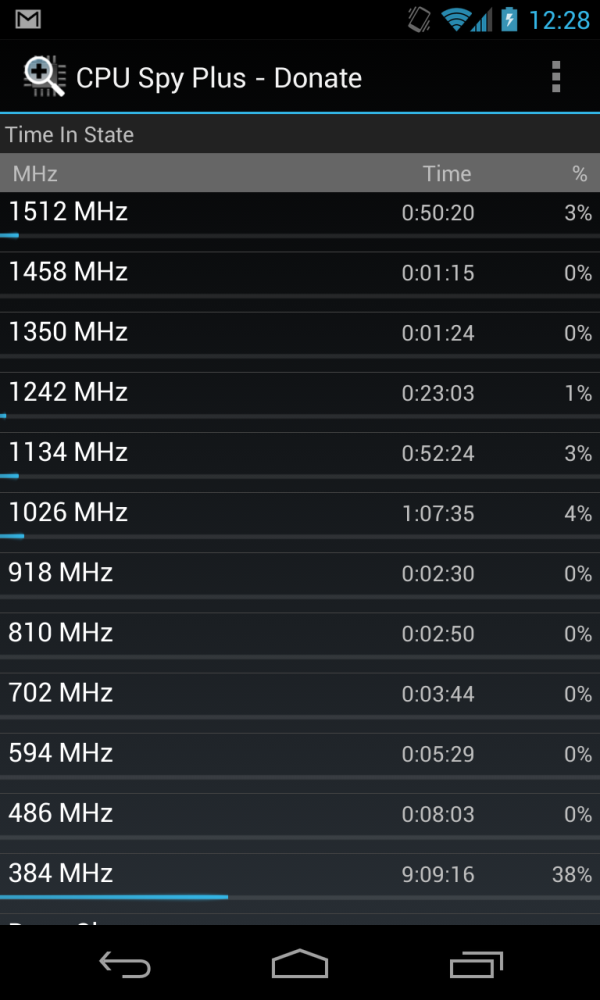
Left - 1.134 GHz during throttling (running tests), Right - All the performance states
I can see the Nexus 4 not use any of the performance states above 1134 MHz when it's getting hot, as shown in the images above. I've tweeted a link to the pastebin for thermald.conf which I believe configures the thermal cutoffs and will be interesting to kernel hackers trying to play with these values.
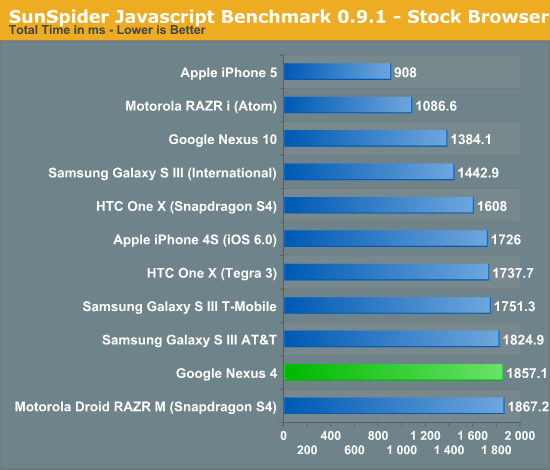
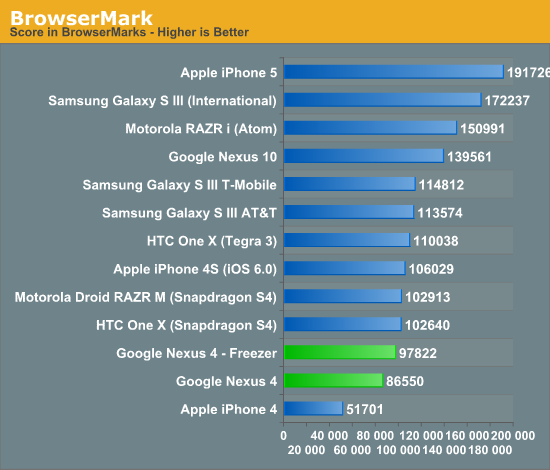
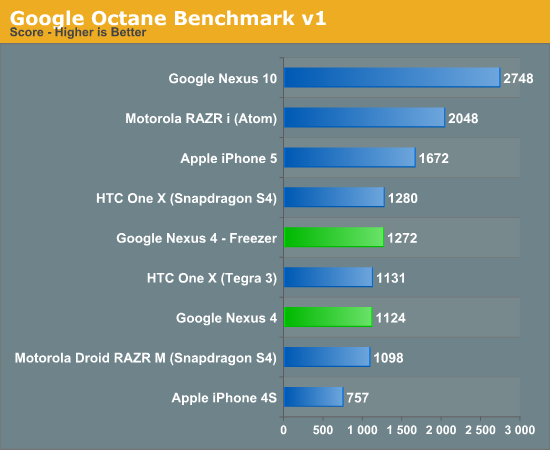
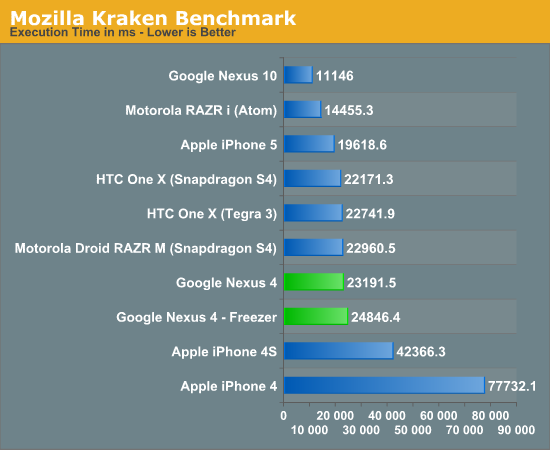
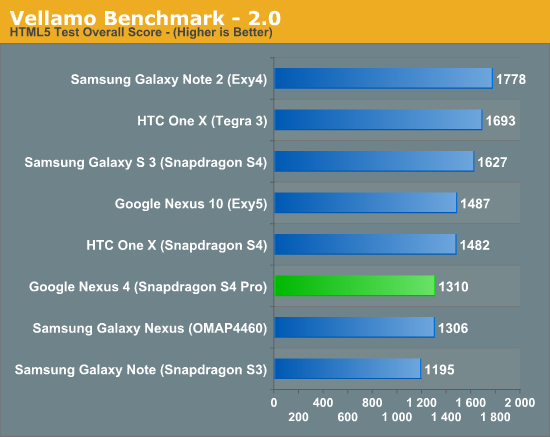
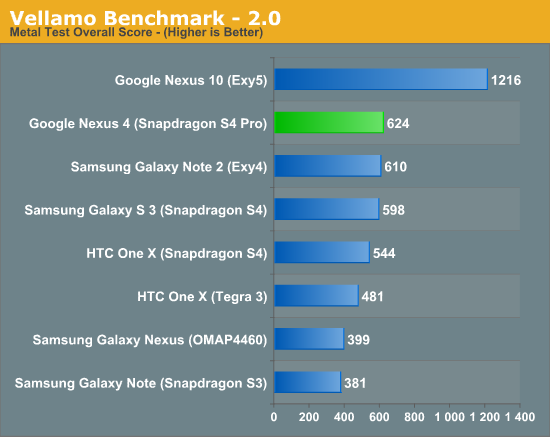
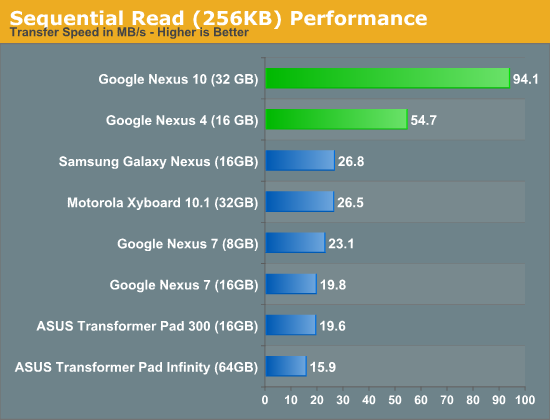
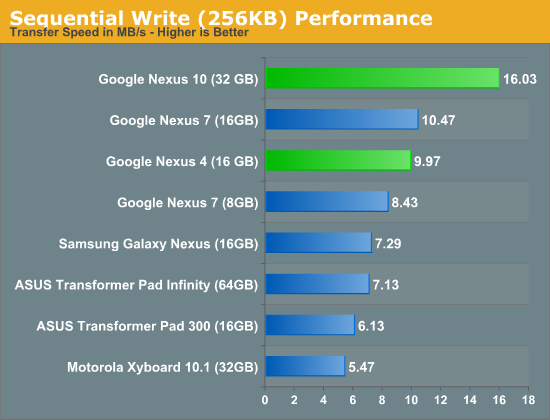
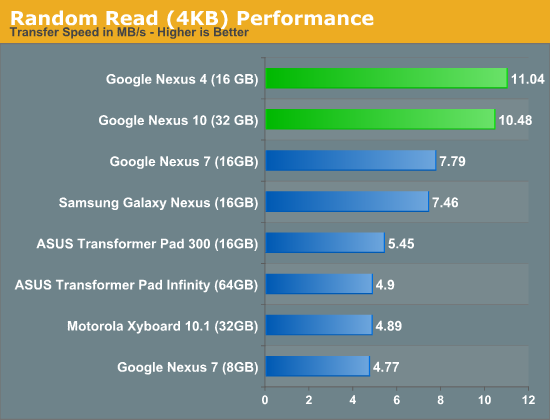
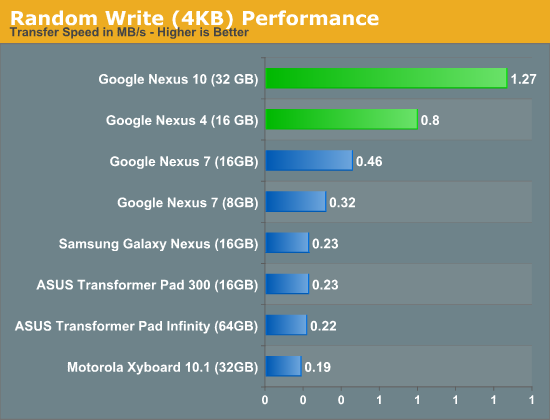
Our CPU performance side is unfortunately still dominated by JavaScript performance tests. The story there is that the Nexus 4 ships with Chrome (and originally shipped with a newer build of Chrome than what was on the market - we were running that updated version all along) and thus the mainline version of the V8 JavaScript engine. OEMs perform their own optimizations to the V8 library, and try to upstream whatever they can into the main project, but in the case of Chrome for Android that means V8 sans secret OEM sauce.










188 Comments
View All Comments
amdwilliam1985 - Tuesday, November 13, 2012 - link
These smart phones and tablets are the old computing devices that you used to love in a new form and shape.I can't remember the last time I got excited about "computer" hardware.
phillyry - Thursday, November 15, 2012 - link
+1A5 - Tuesday, November 13, 2012 - link
Intel, AMD, and Nvidia only really do 1 hardware launch a year now, the motherboards are all essentially the same, and driver reviews are borrrrrring to perform and read.They're still putting up like 3-4 case reviews a month, but there really isn't much else to talk about besides mobile stuff anymore.
Sabresiberian - Tuesday, November 13, 2012 - link
I don't read every article Anandtech publishes; in fact, if there is an article I just skim through, or skip entirely, it will be one about any kind of mobile computing, including smart phones. It doesn't bother me though that Anandtech spends as much time on these things as they do because they still do plenty of high quality articles on mainboards, CPUs, graphics cards, PSUs - the things I am interested in, and they have added editors to cover additional types of hardware, and, bottom line, I don't expect everything they publish to have me in mind.;)
Impulses - Tuesday, November 13, 2012 - link
They still do more in depth CPU and architecture articles than most sites, probably due in large part to Anand's knowledge and contacts. They've been doing a ton of case reviews too... Motherboards have been boring for quite a while. I don't think any of that content has suffered much. The one thing I'd say has suffered is GPU reviews, Anand does a great job of analyzing new architectures at times but their benchmark methods (and variety of tested resolutions) pale in comparison to other sites IMO.Impulses - Tuesday, November 13, 2012 - link
Not that I'm complaining mind you, there's other places to read about that stuff... However none of the quasi-blogs that cover the mobile industry do phone reviews as detailed and in depth as AT. Something as simple as standardized battery testing seems to elude the entire web outside of AT, at best you might find rundown tests with a movie or something lazy like that.tipoo - Tuesday, November 13, 2012 - link
It's just about speed of updates. There's a new top end smartphone every other day, while CPU architectures don't make big changes for up to two years and GPUs at least a year.phillyry - Thursday, November 15, 2012 - link
Home-made desktop PCs are verging on irrelevant.Mobile is where it's heading.
Don't get me wrong, it still exists but it's just becoming less and less relevant.
darklight0tr - Tuesday, November 13, 2012 - link
I have a Galaxy Nexus and was looking to possibly upgrade to the Nexus 4 but there are a few big issues with the phone for me:1. No LTE and it isn't available on Verizon (at least right now).
2. Max of 16GB flash memory. I have the LTE Nexus and enjoy the 32GB of flash memory.
3. Headphone jack and charging port are on OPPOSITE sides of the phone. This is the biggest fail for me. I use my Galaxy Nexus in my car nearly every day and having those two connectors on the same side is very important.
Its too bad because it looks to be a great phone otherwise.
Despoiler - Wednesday, November 14, 2012 - link
The Nexus 4 will never come to Verizon. Not including LTE was primarily a political move, secondary a battery life consideration, and tertiary for SKU simplicity.Verizon had their hands all over the Android releases on the Samsung Nexus causing them to be delayed or scrapped for the next release. It's a dev phone though. Google needs to be able to roll out whatever it wants to when it wants to. Breaking carrier control on handsets is part of what Google has been trying to do with their Nexus phones.
32GB of memory is unnecessary with Google services like Music and Drive. Everything is on the cloud so why does it also need to be on your phone?